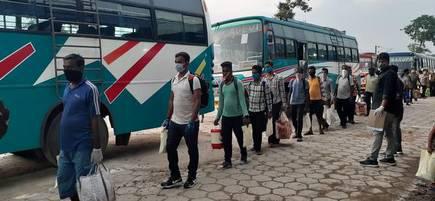Our state government, like its counterparts in India, arranged to bring back migrant workers from across the country in the aftermath of the Covid-19 outbreak. The Railways, on its part, rushed in with special trains and ferried lakhs of workers from Gujarat, Kerala, Tamil Nadu and Andhra Pradesh, among others to Odisha. Not to take a chance, the government plied buses to bring back the left-over workers still stuck in other states. It was treated like a natural calamity and given all the focus and seriousness it deserved. Thousands of quarantine centres had been set up to provide transit shelter to workers and local Sarapanchs were given power at par with District Collectors to facilitate the decision-making process at the ground level. The state government also put in place structured incentives to attract migrants and take care of their needs in quarantine centres. Incentives, both in cash and kind, were announced to facilitate the safe incoming of workers. More importantly, district administrations were directed to create jobs for these people under the Mahatma Gandhi National Rural Employment Guarantee Scheme (MGNREGA) and to make the most of other state and Central government schemes. Authorities were directed to map varied skills of returnees and provide them with jobs according to their skills. Over five lakh workers had returned to Odisha between May and July.
However, now we can see how all these programmes flopped. Not long after the migrant workers reached here, they began to be disillusioned with the promises of the state government. In the absence of quick job guarantee programmes, suitable to workers with different skills, we can now see a rush among them to go back to their workplaces. Under Unlock 4.0, the Centre has allowed most industrial activities to resume. Taking advantage of this, people from Bolangir, Sonepur, Nuapada, Ganjam, Koraput, Rayagada and Sambalpur districts are preparing to go back to where they had come from. With Nuakhai festival gone, they want to go back to their workplaces. Reports reveal that firm owners in Gujarat and Tamil Nadu have engaged middlemen and contractors to lure workers as they are set to resume operations. Workers on their part also are showing keenness to return and have reportedly accepted advance money from middlemen. The eagerness of workers to go back, even as the pandemic has been in an increasingly virulent form, can be gauged by the fact workers move in buses to reach far-off places. Last week, a bus from Ganjam full of migrant workers, on its way to Gujarat, met with an accident near Raipur in Chhattisgarh, killing eight people on the spot and leaving many more injured. Another bus aboard migrant workers bound for Tamil Nadu overturned at Rayagada leaving eight people critically injured.
Such accidents happen as people, jobless for months, are desperate to go back to their workplaces. The administration fast failed to provide them with jobs. It is now showing criminal negligence by not ensuring the safety and security of these outbound people. As the government brought them here, it was obligatory on its part to find them gainful employment. Now that they are left to fend for themselves and being forced to arrange their own return, the administration should ensure their safe passage. Earlier, Union Minister Dharmendra Pradhan urged Railway Minister Piyush Goyal to ply Shramik Special trains to ferry workers back to their workplaces. This was welcome. Train journeys are relatively safer. The despondency and desperation of returnees stem from the fact that they failed to find remunerative employments during repeated lockdowns and shutdowns. While the resilience of our economy is pushing workers to go back to their workplaces despite the pandemic worsening, the authorities must step in and ensure migrant works reach their destinations safely.






































